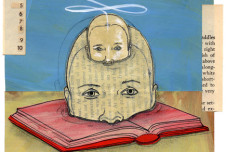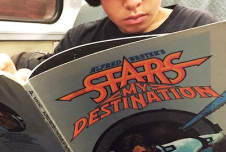I started college in the fall of 2003, when I was seventeen years old. I’d spent the last year dissecting news articles with my AP Government class on the U.S.’s escalating tensions with Iraq. War had moved beyond theory and into inevitability—yet I didn’t know how to express my horror and had even less of an idea of what to do with it. Then, six months after the first time the U.S. invaded Fallujah, I read Tim O’Brien’s The Things They Carried.

In this award-winning novelization of his experiences as a soldier in the Vietnam War, O’Brien tells the story of Rat Kiley and Curt Lemon. Rat and Curt are best friends—inseparable—until the moment when, during a game of catch, Curt steps on a hidden landmine and dies instantaneously. The abruptness of the incident and its placement in the middle of a scene of languor tells one kind of truth about the arbitrariness of war. But what struck me most—what motivated me to find out what I could do instead of merely understand—is the scene that comes after.
The narrator, who is also a soldier in Curt and Rat’s unit, tells the reader that shortly after Curt’s death, they stumble upon a baby water buffalo. Rat strokes its nose—and then shoots it in its right front knee, its back, twice in its flanks. Piece by piece, he tears the buffalo apart. The narrator tells us:
Now and then, when I tell this story, someone will come up to me afterward and say she liked it… That as a rule she hates war stories… but this one she liked. The poor baby buffalo, it made her sad… What I should do, she’ll say, is put it all behind me. Find new stories to tell.
I won’t say it but I’ll think it… You dumb [expletive].
Because she wasn’t listening.
It wasn’t a war story. It was a love story.
The story of Rat and Curt didn’t just illuminate to me that the human costs of war extend far beyond death—it allowed me to feel the anguish of it, albeit a tiny fraction of it. From Uncle Tom’s Cabin to 1984, novels have been used for generations as a way to urge readers to confront real-world sociopolitical issues. And it works—I know because I’m proof.
There’s scientific evidence to back me up, too.
In a recent article entitled “Sitting Still and Reading: Rethinking the Role of Literary Fiction in Civics Education,” literary scholar Annie Schultz argues for the importance of teaching literature alongside simulations of civic practices. She claims engaging students in civic activities, like community organizing or Model United Nations, should be paired with “literary representations of existential journeys to political consciousness.” That, through doing so, “reading and thinking can become emancipatory activities.”
Indeed, an ever-growing body of research shows fiction has the proven capacity to make readers more open-minded, empathetic, and compassionate—capacities critical to ensuring we come out the other side of a global pandemic and a culture of militarized white supremacy with greater societal equity.
Why? Perhaps because a reader sits with a novel for hours, days, weeks—far longer than when consuming any other art form. This concentrated time gives a reader an embodied experience of the other, increasing their awareness and appreciation for differing perspectives.
Canadian cognitive psychologist Keith Oatley, who has been researching the effects of fiction on psychology for decades, found that the neural mechanisms the brain triggers to process narratives are similar to some of their real-life counterparts. For example, when reading the word “kick” or about someone pulling a cord, the same areas of the brain related to physically kicking or grasping are activated.
One study found that one of the most important features of whether or not reading a passage of fiction simulated the default network of the brain—the network believed to support the human capacity to engage in rumination and simulate hypothetical scenes, spaces, and states of mind—was “whether or not they described a person or a person’s mental content.” In other words, being exposed to a character’s thought processes encouraged a deeper level of reflection than when reading abstract or “non-social passages.”
The intimacy of a reader’s relationship with a fictional narrator’s interior dialogue is perhaps one of its most singular characteristics—a process Schultz describes as turning “the inner lives of oppressed characters outward.”
Fourteen years after first reading O’Brien’s book, I found myself back at my undergrad alma mater. I was teaching a writing class and used that same chapter of The Things They Carried—the one with the story about Rat and Curt. In the book, the narrator never self-identifies themselves by either name or gender, but a young cis male student claimed he knew the narrator was male because the narrator didn’t wax poetic about their emotions. When I asked him what character he felt expressed the most emotion in the piece, he paused and said, “Huh—Rat. A man.”
It seems likely that this insight opened a door in the student’s mind—and perhaps he was able to let go of his idea that men couldn’t express a lot of emotion. One group of researchers argue that in “reading the written work of others, you enter their minds. In coming to terms with the mind of another, you can come to better discover your own.” In doing so, we can discover new perspectives through which to understand ourselves and others. Schultz concludes her article: “We do not ask students to limit their thinking to that which is acceptable within the languages and systems in place but, rather, to narrate their own histories and selves as a way to create themselves and society by extension.”
Greater Good Chronicles
Our new series of essays by people trying to apply the science of a meaningful life to their daily lives.Years ago, I stumbled upon Plato’s Apology—his account of Socrates’ defense while on trial for “corrupting the youth of Athens”—in a used bookstore. Socrates explained he was trying to disprove the Oracle of Delphi’s proclamation that he was the wisest of all men—yet, after every interaction he had with men he was told were wise, he determined they were not. It was this exposure of false wisdom (and, I imagine, hubris) that earned him the admiration of the Athenian youth.
One of the groups Socrates discounts is the poets. In his disputation, he says, “Not by wisdom do poets write poetry but by a sort of genius and inspiration.” His claim was that poets couldn’t be wise because their work was rooted in imagination, but I—and maybe the jury who found him guilty and sentenced him to death—believe the opposite to be true. The invented, fictive space is where truth can be found precisely because it doesn’t claim to hold it. Rather, fictional narratives provide the reader with an experience on which to reflect and discern meaning.
When readers read fiction, they know they are encountering human-constructed characters, settings, and situations. This necessary suspension of disbelief—of having to entertain the possibility of other realities—means readers of fiction aren’t merely learning to understand the world as it is, but, also, how to imagine a different one. And it is this act of imagining that makes alternative futures possible—a future without endless, violent conflict, for example.
A white paper published in 2017 by the National Academies of Science goes so far as to make the argument that narratology—“the study of narrative, narrative structure, and narrative discourse”—and narrative psychology—an understanding of “how narrative influences cognitive processes”—should be an interest of national security. The paper was published in response to a policy brief distributed by the Department of Defense which focuses “on a critical and enduring challenge in warfare—the need to understand relevant actors’ motivations and the underpinnings of their will.” The authors of the white paper write:
If there is doubt about the value of narrative… to national security, it only takes one look beneath the events displayed in the daily news…: somewhere prior to the action garnering international attention, communication happened that resonated with an audience, who found more reasons to act than not.
That is a point that becomes only more salient with every passing day, in 2020.
I am not trying to claim that O’Brien’s book single-handedly transformed me into an anti-war activist, but it did force me to sit with the unspeakable brutality of one war and reflect on its implications for a new one. It inspired me to continue seeking out news on the ongoing occupation of Iraq, to start writing political commentary for my college newspaper, to take a class on the Vietnam War, to visit Vietnam with a remarkable professor who is himself a Vietnam vet, to join anti-war marches in Philadelphia, to organize my first demonstration on the fourth anniversary of the invasion of Fallujah with an Iraq War vet in the spring of my senior year.
My first job after college was as the National Media Coordinator for Iraq Veterans Against the War (now called About Face: Veterans Against the War), a national nonprofit made up of post-9/11 service members fighting against American militarism. Since then, I’ve exclusively worked in the fields of communications and community organizing for mission-driven nonprofits and organized labor for more than twelve years.
When a friend recently told me he only reads nonfiction because he (like Socrates!) prefers to read something “real,” I couldn’t help but think he got it wrong. Fiction isn’t the antithesis to reality—it helps shape it. In her new book of essays, Azadi: Freedom. Fascism. Fiction, Arundhati Roy opens by recalling a conversation with her editor. When he asked her what she thought of when she thought of the word “Azadi” (Urdu for “freedom”), she said, “[W]ithout a moment’s hesitation, ‘A novel.’”
Roy continues, “A novel, to me, is freedom with responsibility.” And that, I think, is what makes fiction a revolutionary tool—it doesn’t just provide readers with the capacity to imagine different futures, but, crucially, the very real people in them.







Comments